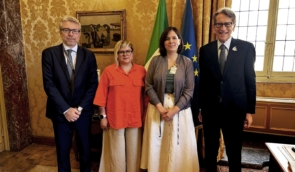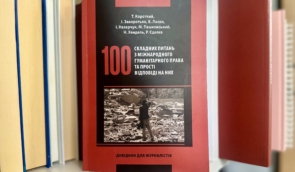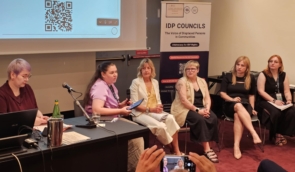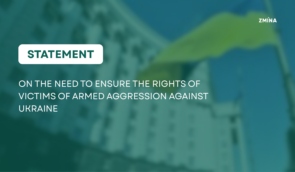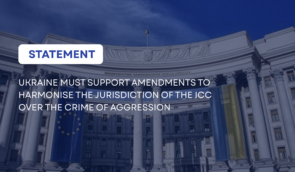Joint letter to the President of Ukraine on ICC Rome Statute ratification
The Coalition for the ICC and its members sent a letter to the President of Ukraine, Volodymyr Zelenskyy, calling for prompt ratification of the ICC Rome Statute and commitment to fight impunity domestically.
President Volodymyr Zelenskyy,
Your Excellency,
We respectfully call on your government to immediately ratify the Rome Statute of the International Criminal Court, which Ukraine signed in 2000 and take all necessary measures to fight impunity for grave international crimes at the domestic level.
Our organisations, the Coalition for the International Criminal Court (CICC) and its members, ask you and your government to put accountability for grave international crimes at the forefront of your agenda.
Ratification of the Rome Statute of the ICC will send a strong message to the international community and to the people of Ukraine that your country is committed to bringing perpetrators of international crimes to justice, and that the suffering of victims will not be ignored. In order to fully address accountability and strive to end impunity, recourse to justice must be readily and permanently available. Full membership in the International Criminal Court will provide this.
In this regard, we welcome the entry into force on 30 June 2019 of the amendment to Article 124 of the Constitution of Ukraine recognising the jurisdiction of the ICC. This removes the final obstacle to Ukraine’s ratification of the Rome Statute.
Your Excellency,
Ukraine has already recognized the role that the ICC can play in addressing impunity, not least with the two formal declarations submitted to the ICC on 17 April 2014 and on 8 September 2015, under Article 12(3) of the Statute, accepting the exercise of the ICC’s jurisdiction in relation to alleged crimes committed in the territory of Ukraine from 20 February 2014 onwards.
Ukraine is also notably the only State not party to the ICC Rome Statute that has acceded to the Agreement on Privileges and Immunities of the Court (APIC) on 29 January 2007. Furthermore, Ukraine committed to secure Rome Statute ratification and implementation as part of the European Union-Ukraine Association Agreement (Article 8). There is now no obstacle to the implementation of this important provision, which is fully in line with the European Union’s policy of strong support and commitment to international justice and the ICC.
With these developments in mind, we warmly welcome the recent announcement by then Deputy Head of your Office, and current Prosecutor General, Ruslan Ryaboshapka, that one of your priorities would be to ratify the ICC Rome Statute signed by Ukraine 20 years ago.
We also take note that during the United Nations General Assembly plenary meeting on the responsibility to protect and the prevention of genocide, war crimes, ethnic cleansing and crimesagainst humanity, held on 28 June 2019, in New York, Your Representative noted “We (Ukraine) removed internal legal obstacles in the way of Ukraine’s ratification of the Rome Statute of the International Criminal Court and actively work on preparation of legislation aimed at implementing the Statute.”
Your Excellency,
122 states have recognized that the Rome Statute of the International Criminal Court is the cornerstone of efforts to end impunity. Global ratification of the Rome Statute is necessary to achieve an international criminal justice system that eradicates safe havens for individuals who commit the worst crimes known to humanity. The high demand for justice and accountability in Ukraine makes ratification of the Statute all the more crucial today.
There are a number of additional benefits to joining the ICC system. By taking this step, Ukraine can help to ensure justice for victims all across the globe and deter future crimes. Moreover, with the ratification of the Rome Statute, Ukraine will be able to exercise full rights of membership to the Assembly of States Parties, the Court’s governing body, which provides an important forum for all States that are committed to ensure justice for victims of grave crimes.
The Assembly discusses and takes decisions on a large number of issues central to the functioning and success of the Court and the Rome Statute system, and thus is among the most important fora of the international legal order.
Your Excellency,
The ICC cannot replace domestic courts, but is one of “last resort” with the ‘principle of complementarity’ at the centre of its Statute. States have the primary responsibility to investigate, prosecute and punish the perpetrators of the Rome Statute crimes and provide redress to victims of these crimes.
Therefore, in addition to ratification of the Rome Statute, we urge you to make it a priority for the government and the new Parliament of Ukraine to fully align its national legislation with the ICC Rome Statute and international law, including incorporating provisions to investigate and prosecute genocide, crimes against humanity and war crimes effectively before its national courts.
Harmonisation of national laws with the Rome Statute will strengthen the domestic justice system and rule of law. We therefore call on you to expedite legislative proposals to this end, including the consideration of the existing Draft Law 0892 (previously 9438) “On amendments to some legislative acts of Ukraine to ensure the harmonization of the criminal legislation with the provisions of international law” adopted in first reading by the previous Rada in June 2019, in this new Parliamentary term.
We believe that there is no better time than now to take the critical next step of ratifying the Rome Statute as a positive affirmation of Ukraine’s commitment to maintaining international peace, security and justice, and ensuring that Rome Statute crimes can be prosecuted at the domestic level.
We hope to count Ukraine among the ICC membership in the near future, and remain available to your office for any questions or assistance that you may have during this process.
Sincerely,
The Coalition for the International Criminal Court (CICC),
and the following CICC member organisations:
- Advocacy Advisory Panel (AAP), Ukraine
- Amnesty International
- Center for Civil Liberties (CCL), Ukraine
- Civil Rights Defenders (CRD)
- Human Rights Center ZMINA, Ukraine
- Human Rights Watch (HRW)
- International Federation for Human Rights (FIDH)
- International Partnership for Human Rights (IPHR)
- International Renaissance Foundation (IRF), Ukraine
- Kharkiv Human Rights Protection Group (KHPG), Ukraine
- Norwegian Helsinki Committee (NHC)
- No Peace Without Justice (NPWJ)
- Open Society Justice Initiative (OSJI)
- Parliamentarians for Global Action (PGA)
- Regional Center for Human Rights (RCHR), Ukraine
- Truth Hounds, Ukraine
- Ukrainian Helsinki Human Rights Union (UHHRU), Ukraine
- Ukrainian Legal Advisory Group (ULAG), Ukraine
- World Federalist Movement (WFM) – Canada
- Women’s Initiatives for Gender Justice (WIGJ)
If you have found a spelling error, please, notify us by selecting that text and pressing Ctrl+Enter.

